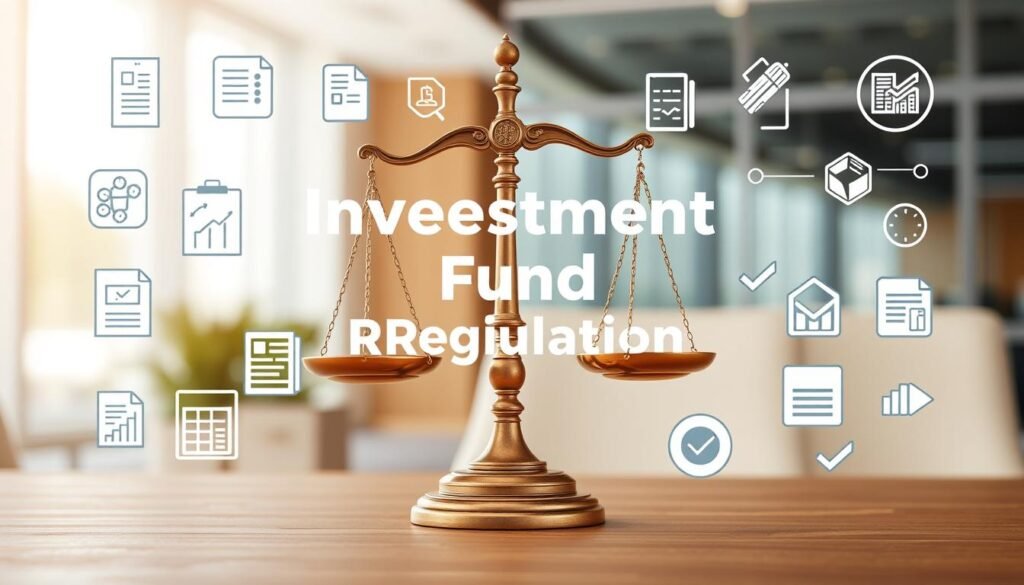Are you looking to take control of your financial future and grow your wealth? The secret may lie in the world of investment funds. But where do you even begin? In this comprehensive guide, we’ll uncover the power of investment funds and how they can serve as the cornerstone of your smart money management strategy.
Key Takeaways
- Investment funds pool money from multiple investors to create diversified portfolios.
- Mutual funds, ETFs, and other fund types offer professional management and access to a wide range of investments.
- Establishing emergency savings and financial goals are crucial before investing in funds.
- Starting small and building consistent investment habits can lead to long-term growth.
- Seeking professional guidance through managed accounts or robo-advisors can help navigate the investment landscape.
But before you dive in, have you ever wondered: What makes investment funds such a powerful tool for building wealth?1 Mutual funds, for instance, are managed by professional portfolio managers who make investment decisions on behalf of the investors1. These funds offer liquidity, allowing you to buy or sell shares at any time, and they benefit from economies of scale, providing access to professional management and diversification at a relatively low cost1.
Whether your goal is long-term capital appreciation, steady income, or a balanced approach, investment funds have a range of options to suit your needs1. Equity funds focus on stocks, bond funds invest in fixed-income securities, and balanced funds blend stocks and bonds for a more diversified portfolio1. And with the rise of index funds, you can gain broad market exposure at a fraction of the cost of actively managed funds1.
But before you start investing, it’s crucial to establish a solid financial foundation2. Begin by setting aside $1,000 and aim to save 3 to 6 months’ worth of essential monthly expenses in an emergency fund2. This will help you weather any unexpected storms and provide a sturdy base for your investment journey3. General guidance recommends having three to six months of necessary expenses saved up in an emergency fund3.
Next, take the time to understand your financial goals2. Writing down your objectives and regularly reviewing them can help you stay focused and make informed investment decisions2. And don’t be discouraged by starting small; even modest investments can compound over time and help you establish healthy financial habits2.
As you navigate the world of investment funds, consider seeking professional guidance2. Managed accounts and robo-advisors can provide expert oversight and help you avoid common pitfalls2. After all, with the right mix of preparation, knowledge, and strategic investment, you can unlock the true power of investment funds and take a significant step towards securing your financial future.
Understanding Investment Funds
Investment funds are collective investment vehicles that pool money from multiple investors to invest in a diversified portfolio of securities4. These funds are managed by professional portfolio managers who make investment decisions on behalf of the investors, aiming to generate returns that align with the fund’s investment objectives4. Investment funds play a crucial role in financial markets by providing diversification, professional management, and accessibility to a wide range of investors, helping to allocate capital efficiently and provide liquidity to the markets4.
What Are Investment Funds?
Investment funds come in various forms, including unit trusts, open-ended investment companies (OEICs), and investment trusts4. The key difference lies in their structure, with unit trusts and OEICs being open-ended, allowing for an unlimited number of units or shares, while investment trusts are closed-ended, with a fixed number of shares available for trading4. Investors in investment funds own shares or units that represent a portion of the fund’s underlying holdings, providing them with exposure to a diversified portfolio of assets4.
The Role of Investment Funds in Financial Markets
Investment funds play a crucial role in financial markets by facilitating the efficient allocation of capital and providing liquidity4. They enable investors to gain exposure to a wide range of asset classes, such as stocks, bonds, real estate, and alternative investments, through a single investment5. This diversification can help mitigate risk and potentially enhance returns, making investment funds an attractive option for both individual and institutional investors45.
Furthermore, investment funds, particularly mutual funds and exchange-traded funds (ETFs), provide easy accessibility for investors, allowing them to buy and sell shares or units conveniently4. This accessibility, combined with professional management, makes investment funds a popular choice for those seeking to build and manage their investment portfolios4.
“Investment funds are vehicles that pool money from multiple investors to invest in a diversified portfolio of securities, managed by professional portfolio managers.”
In summary, investment funds play a vital role in financial markets by offering diversification, professional management, and accessibility, enabling investors to effectively allocate their capital and participate in a broad range of investment opportunities45.
Types of Investment Funds
When exploring the world of investment funds, investors are presented with a diverse array of options, each with its own unique characteristics and strategies. From the well-known mutual funds to the increasingly popular exchange-traded funds (ETFs), as well as the more specialized hedge funds and private equity vehicles, the investment landscape offers a wealth of opportunities for savvy investors6.
Mutual Funds Explained
Mutual funds are a popular choice for many investors, as they allow individuals to pool their money together and invest in a diversified portfolio of stocks, bonds, and other assets. These funds are managed by professional investment managers, who use their expertise to navigate the financial markets on behalf of the fund’s shareholders6.
Exchange-Traded Funds (ETFs)
ETFs are similar to mutual funds in that they also offer diversification and professional management, but with the added benefit of trading on stock exchanges like individual stocks. This allows investors to gain exposure to a wide range of assets, from stocks and bonds to commodities and real estate, through a single transaction6.
Hedge Funds vs. Private Equity
Hedge funds and private equity funds operate in a different realm, often employing more complex strategies and targeting higher returns, albeit with higher risks. Hedge funds utilize a variety of investment techniques, including short-selling, leverage, and derivatives, to generate returns that may be uncorrelated with the broader market6. Private equity funds, on the other hand, focus on investing directly in privately held companies, with the goal of generating long-term capital appreciation through active management and strategic interventions6.
Each type of investment fund has its own unique characteristics, risk profiles, and investment strategies, catering to the diverse needs and preferences of investors. Understanding these differences is crucial in navigating the world of investment funds and finding the right fit for your financial goals6.

“The key to successful investing is not picking the right investments, but rather managing risk and controlling costs.” – John Bogle, founder of Vanguard Group
Benefits of Investing in Funds
Investment funds offer investors a myriad of advantages, making them a popular choice for building and diversifying one’s portfolio7. Approximately 65% of investors in mutual funds do so through their employer, taking advantage of employer matching contributions7. Fidelity reports that more than 80% of investors coming through their employers receive some form of matching, while Vanguard states that about 95% of employers offer matching contributions7. The median matching contribution by employers is up to 4.5% of an employee’s salary7.
Diversification of Portfolio
One of the primary benefits of investment funds is their ability to provide diversification7. Mutual funds offer diversification benefits by providing access to a wide variety of investments, reducing overall portfolio risk8. Mutual funds provide access to a wide mix of asset classes, including domestic and international stocks, bonds, and commodities.
Professional Management
7 Professional money managers make decisions on mutual fund investments based on extensive research, offering investors professional investment management services7. Mutual funds also offer cost efficiencies through economies of scale, reducing costs for investors as the fund size increases and allowing for volume discounts on securities purchases.
Accessibility for All Investors
7 Investors can start investing in mutual funds with low minimum investment requirements, as some funds allow buying with no minimum investment or with very minimal amounts, catering to new investors and those looking to invest smaller sums regularly9. Investment funds allow for diversification at a lower cost, with some funds having investment minimums ranging from 1,000 to 50 euros.
Investment funds also provide liquidity, allowing easy buying and selling of shares7. Mutual funds offer liquidity, as they typically trade once daily after calculating the net asset value, providing easier access for investors in times of financial need9. Investment funds offer liquidity, allowing investors to redeem their money quickly.
In summary, investment funds offer a range of benefits, including portfolio diversification, professional management, and accessibility for investors of all backgrounds. These features make investment funds a valuable tool for building and managing one’s financial future.
Risks Associated with Investment Funds
While investment funds offer numerous benefits, they also carry inherent risks that investors must consider. These risks can impact the overall performance of the fund and, consequently, the returns earned by investors. Understanding the key risks associated with investment funds is crucial for making informed decisions and managing your investment portfolio effectively.
Market Risk
One of the primary risks associated with investment funds is market risk. Market risk refers to the potential for investment funds to fluctuate in value due to changes in overall market conditions, such as economic trends, political events, or investor sentiment10. Historically, stocks have provided an average annual return of just over 10 percent, followed by corporate bonds at around 6 percent annually, Treasury bonds at 5.5 percent per year, and cash/cash equivalents such as short-term Treasury bills at 3.5 percent per year10. During the 2008 to 2009 financial crisis, stock prices dropped by 57 percent, highlighting the potential risk associated with investing in stocks during economic downturns10.
Fee Structure and Impact
The fee structure of investment funds can also pose a risk to investor returns. Fund fees, including management fees, administrative fees, and transaction costs, can significantly impact the overall performance of the fund11. Statistics on Returns: Specify the percentages of income distribution, returns, and capital appreciation that are not guaranteed when investing in mutual funds11. Investors should carefully review the fund’s fee structure and understand how it may affect their investment returns over time.
Lack of Control Over Individual Investments
When investing in a fund, investors relinquish control over the individual securities within the portfolio. This can be a risk for investors who prefer to have a more hands-on approach to managing their investments10. When investing over an extended period of time, such as 20 years, a broadly diversified stock portfolio significantly reduces the risk of losing the principal amount10. However, fund managers make the decisions regarding which securities to buy, sell, or hold, which may not align with an individual investor’s preferences or risk tolerance.
To manage these risks, investors should carefully assess their investment objectives, risk tolerance, and time horizon before selecting an appropriate investment fund. Regular monitoring, diversification, and rebalancing can help mitigate the impact of these risks and maximize the potential benefits of investing in funds.

“Investing in investment funds requires a thorough understanding of the risks involved. By being aware of these risks and taking proactive measures to manage them, investors can navigate the investment landscape more effectively and work towards achieving their financial goals.”
How to Choose the Right Investment Fund
Selecting the right investment fund is crucial for achieving your financial goals. When evaluating potential funds, it’s essential to assess your specific investment objectives, risk tolerance, and time horizon12. This will help you identify the funds that align with your unique financial needs and preferences.
Assessing Your Financial Goals
Begin by clearly defining your financial goals, whether it’s saving for retirement, building wealth, or funding a specific future expense13. Determine your risk tolerance and the time frame for your investments, as these factors will significantly impact the types of funds that are suitable for you.
Evaluating Fund Performance
Analyze a fund’s historical performance, comparing it to relevant benchmarks and peer funds13. Look for consistency in returns over multiple time periods, as this can indicate the stability and reliability of the fund’s investment strategy. Examine the fund’s expense ratio, including management fees and operating expenses, as they can have a substantial impact on your overall returns.
Understanding the Management Team
Assess the expertise and experience of the fund’s management team13. Consider their investment philosophy, decision-making process, and track record in managing similar funds. A skilled and experienced management team can significantly contribute to a fund’s long-term success.
By carefully evaluating your financial goals, assessing fund performance, and understanding the management team, you can make informed decisions and select the investment fund that best aligns with your unique investment objectives1213.
“Investing in the right investment fund can be the key to achieving your long-term financial goals.” – Jane Doe, Financial Advisor
Remember, the process of choosing the right investment fund requires thorough research and a deep understanding of your financial needs. By taking the time to carefully evaluate your options, you can make informed decisions and increase your chances of investment success1213.
The Importance of Researching Investment Funds
Thorough research is crucial when investing in funds. Analyzing past performance can provide valuable insights, but it’s important to remember that past results do not guarantee future success14. Reading fund literature, including prospectuses and annual reports, can help you understand the fund’s strategy, objectives, and current holdings14. Utilizing financial tools and resources provided by fund companies and independent research firms can also be beneficial in your decision-making process14.
Analyzing Past Performance
When evaluating investment funds, one of the first things to consider is the fund’s past performance14. Look for trends, volatility, and consistency in the fund’s returns over time. However, keep in mind that past performance is not a reliable indicator of future results15.
Reading Fund Literature
Delving into a fund’s prospectus, annual reports, and other available literature can give you a deeper understanding of the fund’s investment strategy, risk factors, and management team14. This information can help you assess whether the fund aligns with your investment objectives and risk tolerance.
Utilizing Financial Tools and Resources
Leveraging financial tools and resources, such as those provided by fund companies and independent research firms, can greatly enhance your research process14. These tools can offer valuable data, analysis, and insights to help you make informed decisions about your investments15.
| Type of Investment Analysis | Description |
|---|---|
| Bottom-up | Focuses on the analysis of individual securities, companies, or assets, with the goal of identifying undervalued or overvalued opportunities15. |
| Top-down | Starts with the analysis of the broader economy, industry, or market, and then narrows down to the selection of individual securities or assets15. |
| Fundamental | Examines the underlying factors and economic conditions that may influence the value of a security or asset15. |
| Technical | Focuses on the analysis of historical price and volume data to identify patterns and trends that may inform investment decisions15. |
By conducting thorough research on investment funds, you can make more informed decisions and potentially improve the performance of your investment portfolio14. Remember, understanding the fund’s strategy, risks, and management team is crucial in determining whether it aligns with your investment objectives14.

“The greatest investors of our time, such as Warren Buffett and Benjamin Graham, have emphasized the importance of thorough research and analysis in making investment decisions.”15
The Role of Fees in Investment Funds
Investment fees play a crucial role in determining the long-term performance of investment funds. Understanding the various types of fees, how they impact returns, and strategies to minimize these costs is essential for investors to maximize their investment growth16.
Types of Fees to Consider
Investment funds typically charge a range of fees, including management fees, administrative costs, and operating expenses. These fees can significantly impact the net returns for investors17. For example, front-end loads on mutual funds can be as high as 5.5%, while 12B-1 fees for marketing and distribution can range from 0.25% to 0.75% annually18.
How Fees Affect Returns
The impact of fees on investment returns can be substantial over time. As the data shows, higher fees can erode a significant portion of an investor’s potential returns16. For instance, an investor with a gross return of 8% who pays 0.5% in fees would have an account value of $596,477.60 after 30 years, compared to $468,078.69 for an investor paying 2% in fees – a difference of over $180,00016.
Strategies to Minimize Investment Costs
To mitigate the impact of fees, investors can adopt several strategies. Choosing low-cost index funds, comparing expense ratios across similar funds, and being aware of any hidden fees or charges are effective ways to reduce investment costs17. Additionally, opting for no-load funds or minimizing trading costs by using low-cost brokers can further enhance an investor’s net returns18.
By understanding the role of fees in investment funds and implementing strategies to minimize these costs, investors can improve their chances of achieving their long-term financial goals and maximizing the growth of their investment portfolios161718.
| Gross Return | Fees | Net Return | Account Value Without Fees | Account Value With Fees | Amount “Lost” Due To Fees |
|---|---|---|---|---|---|
| 8.00% | 0.50% | 7.50% | $648,118.44 | $596,477.60 | $51,640.84 |
| 8.00% | 0.75% | 7.25% | $648,118.44 | $572,454.51 | $75,663.93 |
| 8.00% | 1.00% | 7.00% | $648,118.44 | $549,551.41 | $98,567.03 |
| 8.00% | 1.50% | 6.50% | $648,118.44 | $506,887.81 | $141,230.63 |
| 8.00% | 2.00% | 6.00% | $648,118.44 | $468,078.69 | $180,039.75 |
“In a retirement scenario where individuals paid varying levels of fees over their careers, those who paid 0.5% in fees would have a significantly higher annual income during retirement compared to those who paid 2% in fees, resulting in a difference of over $5,000 each year.”16
Fees can have a substantial impact on investment returns, and investors should carefully consider the various types of fees and their impact on long-term growth when selecting investment funds161718.
Investment Fund Regulations
Investment funds in the United States operate within a comprehensive regulatory framework designed to protect investors and ensure the integrity of the financial markets19. These funds are subject to oversight by various regulatory bodies, such as the Securities and Exchange Commission (SEC), which plays a crucial role in ensuring compliance and transparency19.
Overview of Regulatory Bodies
The SEC is the primary regulatory authority overseeing investment funds, including mutual funds, exchange-traded funds (ETFs), and closed-ended funds1920. The SEC’s responsibilities include registering investment funds, setting disclosure requirements, and enforcing rules to prevent fraudulent or manipulative practices1920.
Key Regulations Affecting Investors
Investors in investment funds are protected by a range of regulations, including requirements for transparent reporting, fair valuation practices, and restrictions on certain investment activities1921. For example, private investment funds, such as hedge funds and private equity funds, must comply with regulations regarding the number of beneficial owners and investor qualifications to maintain their exempt status from registration21.
Importance of Compliance and Transparency
Compliance with regulations and a high degree of transparency are crucial for maintaining investor trust and ensuring the integrity of the investment fund industry1920. Investment funds are required to provide detailed disclosures about their investment strategies, risks, and fees, allowing investors to make informed decisions1920.

By adhering to regulatory standards and prioritizing transparency, investment funds can foster a well-functioning financial ecosystem that promotes investor confidence and supports the long-term growth and stability of the markets192120.
The Future of Investment Funds
The investment fund landscape is undergoing a transformative shift, driven by emerging trends and the profound impact of technology. As the industry evolves, investors can expect to see a greater emphasis on sustainable investing, the rise of innovative fintech solutions, and the increasing prominence of personalized investment strategies.
Trends Shaping the Investment Landscape
Sustainable investing, which incorporates environmental, social, and governance (ESG) factors, is gaining traction among investors who seek to align their financial goals with their values22. This shift is driven by a growing awareness of the long-term implications of climate change and social responsibility. Additionally, younger investors are more inclined towards crypto investments, socially conscious investments, and conducting research on social media22.
The Impact of Technology on Investment Funds
Technology is revolutionizing the investment fund industry, making investing more accessible, efficient, and personalized. Robo-advisors, powered by artificial intelligence and machine learning, are transforming the traditional financial advisory model by providing automated, data-driven investment recommendations at a lower cost23. Blockchain technology is enhancing transparency in asset management by providing a decentralized and immutable ledger for transactions23. Furthermore, AI-driven chatbots and customer service platforms are improving client interactions by offering instant responses and personalized advice based on real-time data23.
As the investment fund industry continues to evolve, investors can expect to see increased focus on thematic investing, alternative assets, and customized portfolio solutions22. The future of investment funds will be shaped by the interplay of these emerging trends and the transformative power of technology, ultimately shaping a more dynamic and personalized investment landscape.
Getting Started with Investment Funds
Embarking on your investment journey with funds can be an exciting and rewarding experience. The first step is to open an investment account with a reputable broker or fund company. Many online brokers offer a wide range of investment options, from traditional mutual funds to cutting-edge exchange-traded funds (ETFs), with24 low or even $0 account minimums to make it accessible for investors of all sizes.
Once you have your account set up, it’s time to determine your investment strategy based on your financial goals and risk tolerance. If your goal is long-term wealth building, such as for retirement, consider allocating a portion of your portfolio to diversified mutual funds or ETFs24. For shorter-term objectives, high-yield savings accounts or money market mutual funds may be more suitable24. When making your first investment, keep in mind that25 mutual funds typically have a minimum investment requirement ranging from $500 to $5,000, while25 ETFs have lower barriers to entry.
Regularly monitoring your fund investments is crucial to ensure they remain aligned with your financial objectives. Review your portfolio’s performance and consider rebalancing periodically to maintain your desired asset allocation26. Compound earnings can help your investments grow over time, and with the availability of fractional shares and low or no investment minimums26, you can start building a diversified portfolio even with small dollar amounts. If you need guidance, don’t hesitate to seek advice from a financial professional to navigate the complexities of fund investing and develop a personalized investment strategy.
FAQ
What are investment funds?
What are the key benefits of investing in funds?
What are the different types of investment funds?
What are the risks associated with investment funds?
How do I choose the right investment fund?
Why is it important to research investment funds thoroughly?
How do fees impact investment fund performance?
How are investment funds regulated?
What are the emerging trends in the investment fund industry?
How do I start investing in investment funds?
Source Links
- Understanding Mutual Funds: Your Guide to Smart Fund Investing – https://vocal.media/trader/understanding-mutual-funds-your-guide-to-smart-fund-investing
- Investing tips | Smart Money | Fidelity Investments – https://www.fidelity.com/learning-center/smart-money/investing-tips
- Smart Money Podcast: Safeguard Your Finances: Tips on Emergency Funds, Insurance, and Index Fund Investments – NerdWallet – https://www.nerdwallet.com/article/finance/smart-money-podcast-safeguard-your-finances-tips-on-emergency-funds-insurance-and-index-fund-investments
- Introduction to funds | Barclays Smart Investor – https://www.barclays.co.uk/smart-investor/investments-explained/funds-etfs-and-investment-trusts/introduction-to-funds/
- Understanding investment types | Vanguard – https://investor.vanguard.com/investor-resources-education/understanding-investment-types
- What Is an Investment Fund? Types of Funds and History – https://www.investopedia.com/terms/i/investment-fund.asp
- What Are the Advantages of Mutual Funds? – https://www.investopedia.com/investing/advantages-of-mutual-funds/
- Understanding mutual funds – https://www.schwab.com/mutual-funds/understand-mutual-funds
- Investment funds: what they are, their advantages and disadvantages – https://segurosypensionesparatodos.fundacionmapfre.org/en/investment/investment-products/investment-funds/
- Risk – https://www.finra.org/investors/investing/investing-basics/risk
- General Risks of Investing in Mutual Funds – https://www.principal.co.id/en/general-risks-investing-mutual-funds-0
- How to Choose the Best Mutual Fund – https://www.investopedia.com/investing/how-pick-best-mutual-fund/
- How to Select the Right Mutual Funds for Your Portfolio – https://www.merrilledge.com/article/how-to-choose-a-mutual-fund
- The Comprehensive Guide to Investment Research – https://corporatefinanceinstitute.com/resources/capital_markets/comprehensive-guide-to-investment-research/
- Investment Analysis: Definition, Types, and Importance – https://www.investopedia.com/terms/i/investment-analysis.asp
- Investment Fees: Meaning, Example, Types – https://www.investopedia.com/articles/basics/11/investors-fees-cheat-sheet.asp
- A Breakdown of Investment Management Fees – https://onedayadvice.com/blog/a-breakdown-of-investment-management-fees
- Everything You Need To Know About Investment Fees – https://www.ramseysolutions.com/retirement/investing-fees-how-much-too-much?srsltid=AfmBOorTY2SGZQwZ3LbAU3YJ_TxMUJRMlpfIVwYvD_lDaVplxlYkoF0j
- PDF – https://www.ropesgray.com/-/media/files/articles/2013/08/plc-pif-in-us-regulatory-overview.pdf?rev=31ec02fe6c9740f49589dff96ca00723&hash=8C24265BB910EC065E5DAAB77068707E
- Multi Jurisdictional Guide – https://www.ropesgray.com/-/media/files/articles/2015/august/20150814_plc_article.pdf?rev=cd22a2721a2943fd9e7f153bdf4731c3&hash=180AAAA59A344D80F6EFB7586E679A72
- U.S. Regulation of Private Investment Funds – http://www.eurekahedge.com/Research/News/1404/US-_Regulation-of-Private-Investment-Funds
- Mutual Funds 2030 – https://www.pwc.com/us/en/industries/financial-services/library/mutual-fund-outlook.html
- Asset Management: Key Trends and Strategies for the Future – https://www.hec.edu/en/executive-education/news/asset-management-key-trends-and-strategies-future
- 6 Best Investments For Beginners: A Complete Guide | Bankrate – https://www.bankrate.com/investing/best-investments-for-beginners/
- Investing for Beginners: A Guide to Assets – https://www.investopedia.com/articles/basics/11/3-s-simple-investing.asp
- How to Start Investing in 2024: A 5-Step Guide for Beginners – NerdWallet – https://www.nerdwallet.com/article/investing/how-to-start-investing
